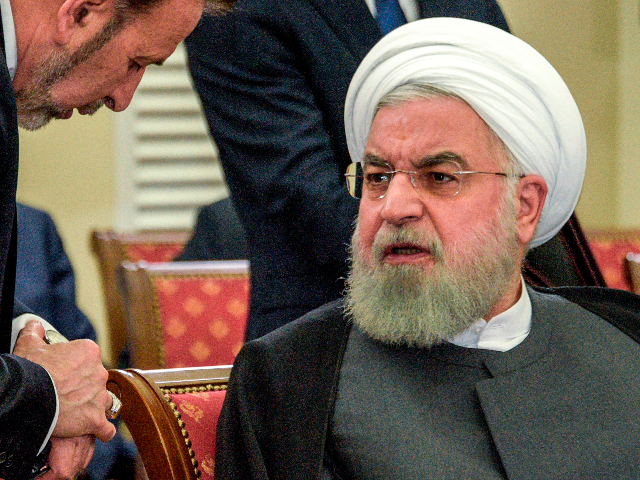Iranian President Hassan Rouhani, currently presiding over the deadliest coronavirus outbreak in the world, rejected American offers of medical assistance on Wednesday and took the opportunity to complain about U.S. sanctions against Iran’s nuclear weapons program and terrorist activities.
Iran’s Tasnim News Agency reported on Rouhani’s remarks, with a bonus sneer from a Foreign Ministry spokesman who blew off U.S. Secretary of State Mike Pompeo’s offer of humanitarian assistance:
“Unfortunately, those who imposed sanctions and blocked the (Iranian) people’s access to even medicines and foodstuffs (and) have taken the most vicious act against the Iranian nation over the past two years” are now pretending to be sympathetic and offering help, Rouhani said, addressing a cabinet session in Tehran on Wednesday.
“If you (the American officials) are really honest, at least lift the sanctions on drugs,” he said, adding that it would be the first step to show their sincerity.
“Our people are well aware that you are lying; you are not telling the truth,” the Iranian president went on to say.
Elsewhere in his remarks, Rouhani expressed his gratitude to all governments and nations that have helped or announced their readiness to help the Islamic Republic to contain the coronavirus epidemic.
US Secretary of State Mike Pompeo said in a statement on Friday that his country had offered Iran assistance in the fight against the coronavirus.
On Saturday, Iranian Foreign Ministry Spokesman Seyed Abbas Mousavi dismissed Pompeo’s remarks as hypocritical and deceitful propaganda.
The official Iranian government death toll from the coronavirus as of Friday is 107, with 3,500 infections. Few either inside or outside of Iran believe those numbers, especially since the disease is cutting such a wide swath through Iran’s leadership. Two more officials were reported dead at the end of the week, and Rouhani’s cabinet meetings seem to have another empty seat each time one is convened.
Iran’s oil minister, Bijan Namdar Zangeneh, told reporters at an OPEC meeting Vienna on Friday that Iran is being more honest about infection totals than other countries. He also complained about U.S. sanctions, insisted Iran “has not received any important assistance from any country,” and accused the United States of “lying” about the Iranian government’s response to the epidemic.
“Food, oil, oil products, petrochemicals, iron, copper, all are under the sanctions. With which money can we buy food and drugs for the Iranian people?” Zangeneh asked, having perhaps forgotten about the huge windfall of money bestowed upon his regime by the Obama administration.
Angry Iranians have taken to the streets several times since the infamous “pallets of cash” were delivered to complain about the government squandering its nuclear deal windfall on foreign military adventures. The coronavirus epidemic brought more protesters who probably will not be pleased to watch their arrogant rulers refuse valuable assistance while so many civilians are suffering.
Naturally, the Iranian regime has started floating rumors that the coronavirus is actually an American bio-weapon that grew out of control, which might seem like the usual absurd totalitarian propaganda intended to divert public anger away from the government until one recalls the Iranians have “justified” international terrorism in the past with far less dramatic grievances than an alleged biological warfare attack that crippled their already tottering economy.
Whatever it decides to do internationally, the regime is talking about using the epidemic as an opportunity to inflict even more violence on its battered population. On Friday Iranian officials threatened to “use force” against civilians who violate internal travel restrictions, particularly those who take school and business closings as an occasion to visit Caspian Sea beaches and other vacation destinations.
CNN noted on Thursday that Iran is running afoul of some religious tensions as it grapples with the large number of coronavirus dead (which appears from even the most cursory inspection to be much higher than 107, although not every body bag appearing in smuggled video footage is necessarily a coronavirus victim).
According to CNN’s sources, the burial requirements for coronavirus victims are very different from traditional Iranian Islamic procedures for washing and interring corpses, so bodies are “piling up” at morgues while each is tested for infection.
The sources who gave CNN this information requested anonymity, fearing reprisals from the regime. At least one person has been arrested for distributing undercover video filmed inside a morgue.

COMMENTS
Please let us know if you're having issues with commenting.